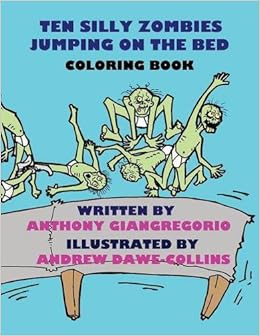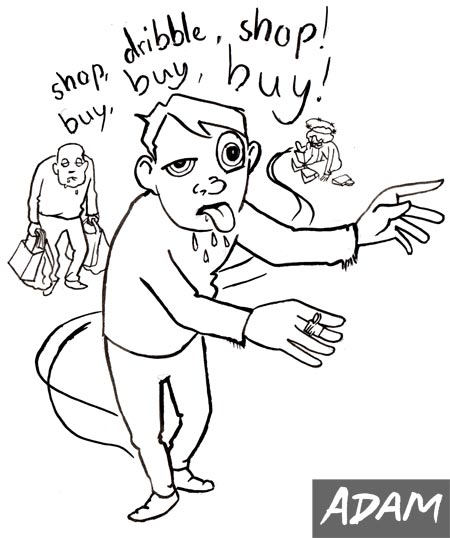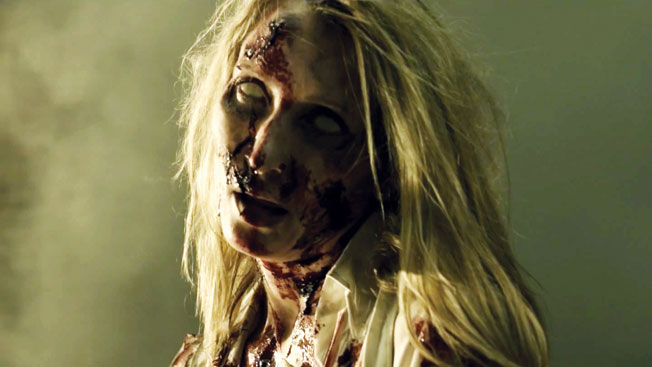To clarify,
although I was very critical of the zombie ads that I’ve discussed here and
here, for the most part I actually enjoy the commercials that I’ve derided so
far. The ads are fun, but I don’t think they show any real understanding of how
zombies function or use them in a way that is consistent with the very loose
constraints of the “genre” (stretching that word a bit, but you know what I
mean).
I try very hard not to be a zombie snob, and I’m far from a purist – I am
pro fast-zombie, for the record, and I absolutely love Scott Kenemore’s Zombie, Ohio, which centers around a
zombie that thinks and talks – but the ads that I’ve already gone over were very
clear examples of bad zombies. However,
their failures as zombies underlie an interesting point: the zombie figure is
so fluid that its relative success or failure isn’t predicated on what the
zombie itself does or does not do – whether it talks or moans, walks or runs,
eats human flesh or any flesh – but rather on the effect it has on its
audience. Zombies, whether they are horrific or comedic, traditional or modern,
operate by playing on specific concerns and anxieties that permeate our
culture. Mortality, contagion, ineffective government, over-reliance on
technology, to name just a few. The safe,
sanitized, and stupid zombies (even the ones that seem to have high IQs) from these commercials don’t do any of that. As
such, they are entirely superfluous and unnecessary. Interestingly enough,
though, these ineffectual zombie presentations actually operate on a certain
figurative zombism in their target demographics. What type of person buys cars,
or even candy, because of a clever commercial? Deep critical thinkers?
Discerning shoppers? Or mindless consumers impelled only by desire?
 |
| Zombies: You're doing it wrong |
Here's a hint:
 |
| via AdamWilson.info |
But enough
complaining. My endless bellyaching notwithstanding, there are some really good
zombie commercials out there that not only stay true to the conventions that
have come to define the zombie over the last 45 years and reflect the cultural
uncertainties that have shaped them, but also effectively market the “products”
they are trying to sell. I had to throw scare quotes there because the first
commercial I’m going to talk about is apparently selling CPR. As in cardiopulmonary
resuscitation. Which isn't really a product. Or for sale. Anyway, check out this great spot from the Heart and Stroke Foundation of Canada.
posted by Heartandstrokefdn on Youtube
Okay, first
things first: it’s kind of cheesy. Not full on cheese, mind you, but not
exactly Frank Darabont either. The makeup is actually pretty good and the ad is well-edited, but the music and fog are a bit over the top and, more importantly, it doesn't push the zombie figure much past cliche. Beyond that though, the primary slogan, "CPR makes you undead," while clever, might also be confusing (2:36). Because, um, being undead is... ungood (doublplusungood, even). Once you look past the obvious flaws, however, this commercial does a lot right. Though cliched, the zombies are friggin' zombies. They're bloody, they swarm, they eat warm flesh, and they are most certainly contagious. What's more, they are clearly set apart as something the viewer does not want to be or become. Zombie = bad. Simple. The protagonist, for her part, is readily relatable; i.e. she provides a clear Self for viewers to align with. She does what we would like to think that we would do. When she recognizes danger, she runs from it. When she falls (it's not her fault she's a white lady in a horror clip), she capably defends herself, even beheading a zombie. Her desire to stay alive is a counterpoint to the zombies desire to end it, both of which reinforce the idea that "being alive is a good thing." Which is a big part of the message that the commercial is trying to get across.
Being alive is good and CPR keeps you alive. That message becomes a little muddled after the zombies resuscitate the woman only to devour her - So it keeps you alive long enough to die a more horrible death? Sweeeet! - but overall I think it accomplishes its two goals rather well. The first, as I've said, is to spread the message that CPR saves lives (if only temporarily). However, it also wants to briefly instruct viewers how to react when someone suffers cardiac arrest. By providing 3 simple, easy to remember instructions, "1. Call 9-1-1. 2. Push hard and fast about twice every second. 3. Don't hesitate, you can't do harm," the clip situates CPR as something that anyone can do (1:43). Not only do you not need more training than a commercial provides, you don't even need a functioning brain. Whether or not that message is actually true or not is irrelevant. What matters, rather, is that that is the message (more or less) that they want to convey, and they do. Don't hesitate, i.e. don't worry, don't even think.
Your reaction to cardiac arrest should be a mindless response, an instinct so profound not even death via a zombie plague would erase it from your memory: CPR, now. There are certainly problematic readings that could be made about a commercial that only appears interested in keeping us alive long enough to be consumed and to become consumers, but for right now I'm more interested in how well it achieves its goal of increased CPR awareness.
I'd like to close with my favorite zombie commercial. It's not the funniest, and it might not be the most memorable. It certainly isn't selling anything as worthwhile as CPR. But it gets zombies in a way most of the others just don't seem to, and that sets it apart. I don't have a problem with funny, snarky, or happy zombies (Snow White and the Seven Commercial Zombies?), but fear sells and zombies can be very scary, so why not use them that way? Diehard, a brand whose name just seems to beg for them to use zombies in their marketing, does.
Being alive is good and CPR keeps you alive. That message becomes a little muddled after the zombies resuscitate the woman only to devour her - So it keeps you alive long enough to die a more horrible death? Sweeeet! - but overall I think it accomplishes its two goals rather well. The first, as I've said, is to spread the message that CPR saves lives (if only temporarily). However, it also wants to briefly instruct viewers how to react when someone suffers cardiac arrest. By providing 3 simple, easy to remember instructions, "1. Call 9-1-1. 2. Push hard and fast about twice every second. 3. Don't hesitate, you can't do harm," the clip situates CPR as something that anyone can do (1:43). Not only do you not need more training than a commercial provides, you don't even need a functioning brain. Whether or not that message is actually true or not is irrelevant. What matters, rather, is that that is the message (more or less) that they want to convey, and they do. Don't hesitate, i.e. don't worry, don't even think.
Your reaction to cardiac arrest should be a mindless response, an instinct so profound not even death via a zombie plague would erase it from your memory: CPR, now. There are certainly problematic readings that could be made about a commercial that only appears interested in keeping us alive long enough to be consumed and to become consumers, but for right now I'm more interested in how well it achieves its goal of increased CPR awareness.
I'd like to close with my favorite zombie commercial. It's not the funniest, and it might not be the most memorable. It certainly isn't selling anything as worthwhile as CPR. But it gets zombies in a way most of the others just don't seem to, and that sets it apart. I don't have a problem with funny, snarky, or happy zombies (Snow White and the Seven Commercial Zombies?), but fear sells and zombies can be very scary, so why not use them that way? Diehard, a brand whose name just seems to beg for them to use zombies in their marketing, does.
 To begin with, this commercial isn't being cute. It starts out in full out life or death flight from a pursuing horde of ravenous zombies. Who, by the way, are serious business zombies. They're fast, they're scary, and, though the commercial has quick cuts that never really focus on them for too long, they definitely look the part. Make no mistake, broad daylight or not, this is a horror commercial and that makes a huge difference. Because it lets the zombies do what zombies do - they aren't here to talk shit on the bus or pick you up at a bar, and they definitely aren't here to save your life. These zombies want to eat your face. ASAP. And they should.
To begin with, this commercial isn't being cute. It starts out in full out life or death flight from a pursuing horde of ravenous zombies. Who, by the way, are serious business zombies. They're fast, they're scary, and, though the commercial has quick cuts that never really focus on them for too long, they definitely look the part. Make no mistake, broad daylight or not, this is a horror commercial and that makes a huge difference. Because it lets the zombies do what zombies do - they aren't here to talk shit on the bus or pick you up at a bar, and they definitely aren't here to save your life. These zombies want to eat your face. ASAP. And they should.
BECAUSE THEY'RE ZOMBIES!
Zombies can do a lot of other things, but the thing they should want to do more than any other is make you look like this
Of course, it's not just the zombies that have our friend here looking like she wants to cry because of how real shit just got: she is also horrified by the behavior of her fellow survivor, who couldn't spare even a second of effort to try to help her escape the zombies' grasping hands. This is a dynamic, while extremely familiar to even the most casual zombie fan, that none of the other commercials have ever approached. Diehard clearly sets the humans as Self that the audience sides with out of a shared desire not to get eaten, and the zombies as the awful Other that we don't want to become or be near, but they don't hide from the fact that sometimes, especially during the zombie apocalypse, the Self kinda sucks. A lot of the tension in zombie narratives is actually provided by the troubling, dangerous, or selfish actions of other humans. This ad does a great job of setting the humans (unnecessarily) at odds with one another in their attempts to survive. So Mr. Think-for-himself-er runs off and abandons the pretty, seemingly helpless woman and 30 seconds in we still have no idea what they hell is going to happen or, more important given the context, what the hell we're supposed to buy. Suspense is a valuable tool for a commercial. It keeps you from changing the channel (why aren't there more horror ads?). Anyway, what we learn by the end of the clip is that during a zombie outbreak your chances of survival are only as good as the choices you make.
This begins with a decision to forsake a friend in need (a decision that gets reciprocated), but ultimately centers around a choice in car battery brands. Other brands don't last and will let you down when you need them. Other brands will get you killed. Seriously, selfish dude gets eaten. Diehard we see, however, is durable. Reliable. Safe. When the world goes to shit, when your government and police have failed you, when your friends let you down, Diehard will still be there to start your car. When the dead rise to eat your face "Life Demands Diehard."
It's an effective ad (like the CPR ad, it actually shows its product doing what it is supposed to do) and it employs zombies in a way that is consistent with the conventions that have made them so popular: a group of antagonistic survivors versus a horde of zombies - mindless, flesh-eating zombies. None of the other commercials come close to getting zombies this right (even the fairly well executed CPR spot). I don't know that that's going to make me more likely to buy a Diehard battery or not, but I appreciate the effort.
What'd I miss? What other zombie ad campaigns have you enjoyed? Or disliked? Let me know in the comment section below.




No comments:
Post a Comment